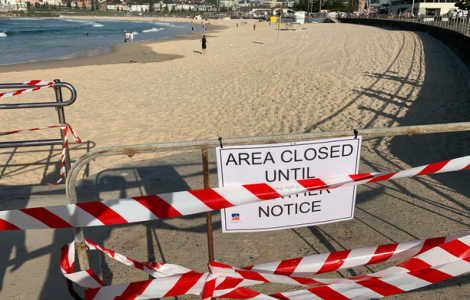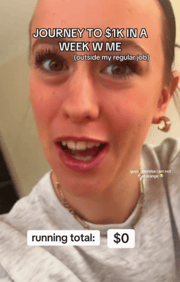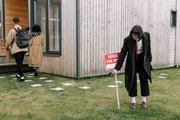‘There’s nothing there now’: Once-buzzing Aussie hotspot turns into a ghost town
By
Maan
- Replies 0
With breathtaking views and a world-famous location, one stretch of prime real estate should be thriving.
Instead, it’s facing an unexpected downturn that has left locals and business owners deeply concerned.
What’s happening behind the scenes paints a worrying picture for one of Australia's most iconic destinations.
With sweeping views of Bondi Beach, Campbell Parade should have been a bustling hub for tourists and locals alike.
Instead, rows of empty shopfronts, some covered in dust and plastered with ‘For Lease’ signs, gave the once-thriving strip an eerie, abandoned feel.
Mojos Tapas Bar, which had ‘been in business for over 15 years’, confirmed that it had become the latest business casualty along the famous stretch.
It joined other well-known names like Bondi Hardware, The Anchor, Neighbourhood, and Bar34—all of which had shut their doors.
Alan Cunningham, owner of Bar34, shared that the area was experiencing a ‘perfect storm’ of challenges that was slowly eroding the night-time vibe.
‘There’s nothing there now...I think it’s quite sad,’ he said.
He pointed to ‘premium rents’, tightened restrictions, and a significant drop in tourist numbers as major issues.
A $68 million property deal had led to the closure of Noah’s backpackers, a once-popular spot packed with international visitors, but the proposed redevelopment had since stalled.
‘A full beach at Bondi does not mean all the businesses in Bondi are benefiting from them,’ Cunningham said.
‘The only guys that surviving are obviously the landowners that have hotels or the franchise operations.’
The shutdown of Noah’s had been particularly damaging to nightlife venues like Bar34, which once had queues of over 100 people.
Cunningham, who bought into the venue in 2014, said it used to thrive off the backpacker crowd and live music.
‘No one’s got any money to go out and buy drinks,’ he said.
The shift in lifestyle culture—from late nights to early mornings—also played a part, with many locals now opting for sober sunrises and exercise over evening outings.
‘Friday night in Bondi are normally dead. I am assuming because everyone wants to get up early,’ said a former bartender from Beach Road Hotel.
The rise of early-morning ‘sober raves’ and 6am coffee runs now overshadowed the late-night economy.
Elsewhere in Bondi, newer venues like Saltys, Curly Lewis, and longstanding institutions like Ravesis and Bondi Royal still attracted crowds, especially on weekends.
Further along the coast, major redevelopment efforts had rejuvenated other areas with high-end restaurants and modern bars.
However, red tape continued to choke local hospitality operators.
Cunningham said restrictions around noise and drinking outdoors had added to the mounting pressure.
Similar complaints had been echoed across Sydney, with many arguing the city’s nightlife had been ‘strangled by red tape’.
NSW Premier Chris Minns previously criticised ‘useless’ alcohol laws, stating: ‘There’s just too many rules and regulations, particularly when it comes to hospitality or having fun in Sydney.’
‘There’s too many places around Sydney, not just in a CBD, that close pretty close to 8:30pm and there’s a lot of people that want to go out and spend money and drive the economy.’
‘Having an economy that fires after 5pm during the week is really important for cities like Sydney.’
Waverley Council said that it had been working to ‘re-energise’ Bondi’s economy, especially at night.
A spokesperson said the council had reviewed outdoor dining restrictions, allowing for more footpath seating and longer trading hours.
‘Council resolved to review and relax restrictions around outdoor dining options and recently updated regulations to further support businesses,’ they said.
Despite those efforts, Cunningham said more needed to be done.
‘They’ve got to decide what they want Bondi to be,’ he said.
‘Do we want it to be a vibrant, late-night entertainment spot, say, like South Beach in Miami?’
He warned that many venues had been told to hold on until summer, but he wasn’t sure they could survive that long.
‘Last year, winter trading numbers started after Anzac Day in April,’ he said.
‘This year, it felt like it started in February...the young people just aren’t around. We can’t sustain it.’
The hospitality sector had become the hardest-hit industry nationwide, recording a 9.2 per cent closure rate in the 12 months to February—up from 7.1 per cent the previous year.
Data from CreditorWatch pointed to rising food, energy, rent, wages, and insurance costs as major pressures.
The impact had been even worse for venues relying on office workers and tourists, both of which had declined.
To support the area, Waverley Council announced a New Year’s Eve party for 15,000 people and a return of the Bondi Festival in July.
‘Council is investing record amounts into arts, culture and events next financial year to activate and bring life to Bondi, as well as investing into our streets such as Hall and Roscoe Streets to beautify the area,’ the spokesperson said.
Still, Cunningham feared those efforts might not be enough.
Bar34 officially closed its doors several months ago.

With so many changes hitting Bondi’s once-thriving strip, do you think the area can bounce back to its former glory? Let us know your thoughts in the comments.
Instead, it’s facing an unexpected downturn that has left locals and business owners deeply concerned.
What’s happening behind the scenes paints a worrying picture for one of Australia's most iconic destinations.
With sweeping views of Bondi Beach, Campbell Parade should have been a bustling hub for tourists and locals alike.
Instead, rows of empty shopfronts, some covered in dust and plastered with ‘For Lease’ signs, gave the once-thriving strip an eerie, abandoned feel.
Mojos Tapas Bar, which had ‘been in business for over 15 years’, confirmed that it had become the latest business casualty along the famous stretch.
It joined other well-known names like Bondi Hardware, The Anchor, Neighbourhood, and Bar34—all of which had shut their doors.
Alan Cunningham, owner of Bar34, shared that the area was experiencing a ‘perfect storm’ of challenges that was slowly eroding the night-time vibe.
‘There’s nothing there now...I think it’s quite sad,’ he said.
He pointed to ‘premium rents’, tightened restrictions, and a significant drop in tourist numbers as major issues.
A $68 million property deal had led to the closure of Noah’s backpackers, a once-popular spot packed with international visitors, but the proposed redevelopment had since stalled.
‘A full beach at Bondi does not mean all the businesses in Bondi are benefiting from them,’ Cunningham said.
‘The only guys that surviving are obviously the landowners that have hotels or the franchise operations.’
The shutdown of Noah’s had been particularly damaging to nightlife venues like Bar34, which once had queues of over 100 people.
Cunningham, who bought into the venue in 2014, said it used to thrive off the backpacker crowd and live music.
‘No one’s got any money to go out and buy drinks,’ he said.
The shift in lifestyle culture—from late nights to early mornings—also played a part, with many locals now opting for sober sunrises and exercise over evening outings.
‘Friday night in Bondi are normally dead. I am assuming because everyone wants to get up early,’ said a former bartender from Beach Road Hotel.
The rise of early-morning ‘sober raves’ and 6am coffee runs now overshadowed the late-night economy.
Elsewhere in Bondi, newer venues like Saltys, Curly Lewis, and longstanding institutions like Ravesis and Bondi Royal still attracted crowds, especially on weekends.
Further along the coast, major redevelopment efforts had rejuvenated other areas with high-end restaurants and modern bars.
However, red tape continued to choke local hospitality operators.
Cunningham said restrictions around noise and drinking outdoors had added to the mounting pressure.
Similar complaints had been echoed across Sydney, with many arguing the city’s nightlife had been ‘strangled by red tape’.
NSW Premier Chris Minns previously criticised ‘useless’ alcohol laws, stating: ‘There’s just too many rules and regulations, particularly when it comes to hospitality or having fun in Sydney.’
‘There’s too many places around Sydney, not just in a CBD, that close pretty close to 8:30pm and there’s a lot of people that want to go out and spend money and drive the economy.’
‘Having an economy that fires after 5pm during the week is really important for cities like Sydney.’
Waverley Council said that it had been working to ‘re-energise’ Bondi’s economy, especially at night.
A spokesperson said the council had reviewed outdoor dining restrictions, allowing for more footpath seating and longer trading hours.
‘Council resolved to review and relax restrictions around outdoor dining options and recently updated regulations to further support businesses,’ they said.
Despite those efforts, Cunningham said more needed to be done.
‘They’ve got to decide what they want Bondi to be,’ he said.
‘Do we want it to be a vibrant, late-night entertainment spot, say, like South Beach in Miami?’
He warned that many venues had been told to hold on until summer, but he wasn’t sure they could survive that long.
‘Last year, winter trading numbers started after Anzac Day in April,’ he said.
‘This year, it felt like it started in February...the young people just aren’t around. We can’t sustain it.’
The hospitality sector had become the hardest-hit industry nationwide, recording a 9.2 per cent closure rate in the 12 months to February—up from 7.1 per cent the previous year.
Data from CreditorWatch pointed to rising food, energy, rent, wages, and insurance costs as major pressures.
The impact had been even worse for venues relying on office workers and tourists, both of which had declined.
To support the area, Waverley Council announced a New Year’s Eve party for 15,000 people and a return of the Bondi Festival in July.
‘Council is investing record amounts into arts, culture and events next financial year to activate and bring life to Bondi, as well as investing into our streets such as Hall and Roscoe Streets to beautify the area,’ the spokesperson said.
Still, Cunningham feared those efforts might not be enough.
Bar34 officially closed its doors several months ago.
Key Takeaways
- Campbell Parade in Bondi faced widespread business closures despite its iconic beachfront location.
- Rising rents, fewer tourists, and red tape were blamed for a collapse in the area’s nightlife economy.
- Alan Cunningham said nightlife had vanished, with venues like Bar34 struggling to survive.
- Waverley Council introduced events and relaxed dining rules, but many feared it was too little, too late.
With so many changes hitting Bondi’s once-thriving strip, do you think the area can bounce back to its former glory? Let us know your thoughts in the comments.
Last edited:








